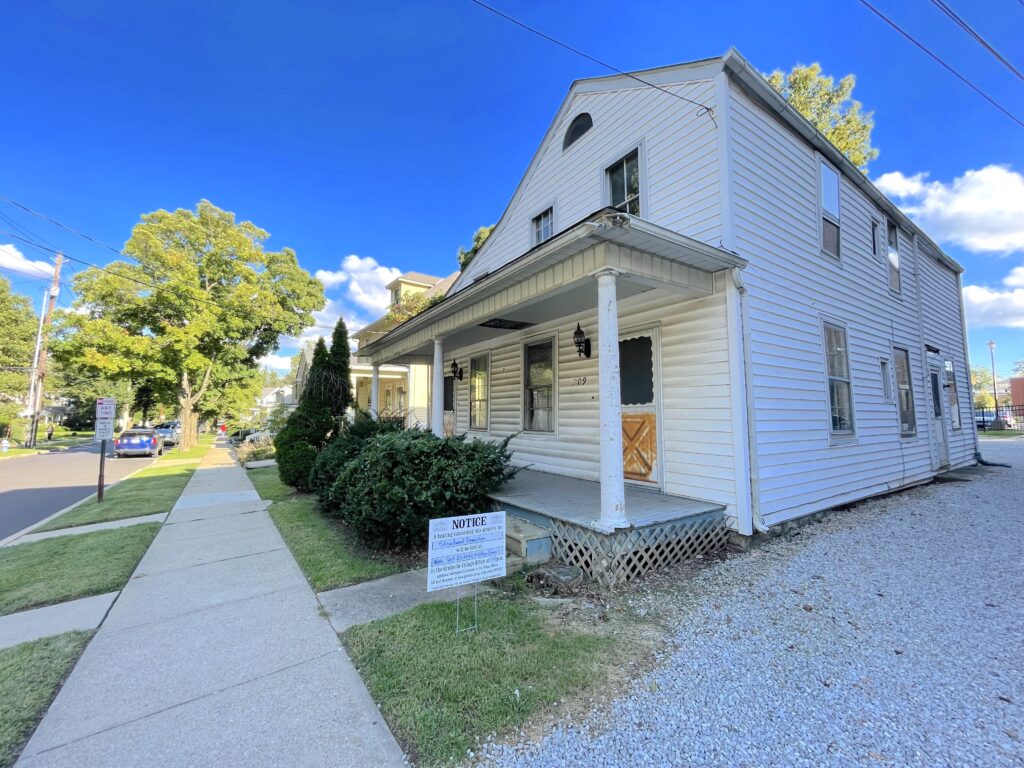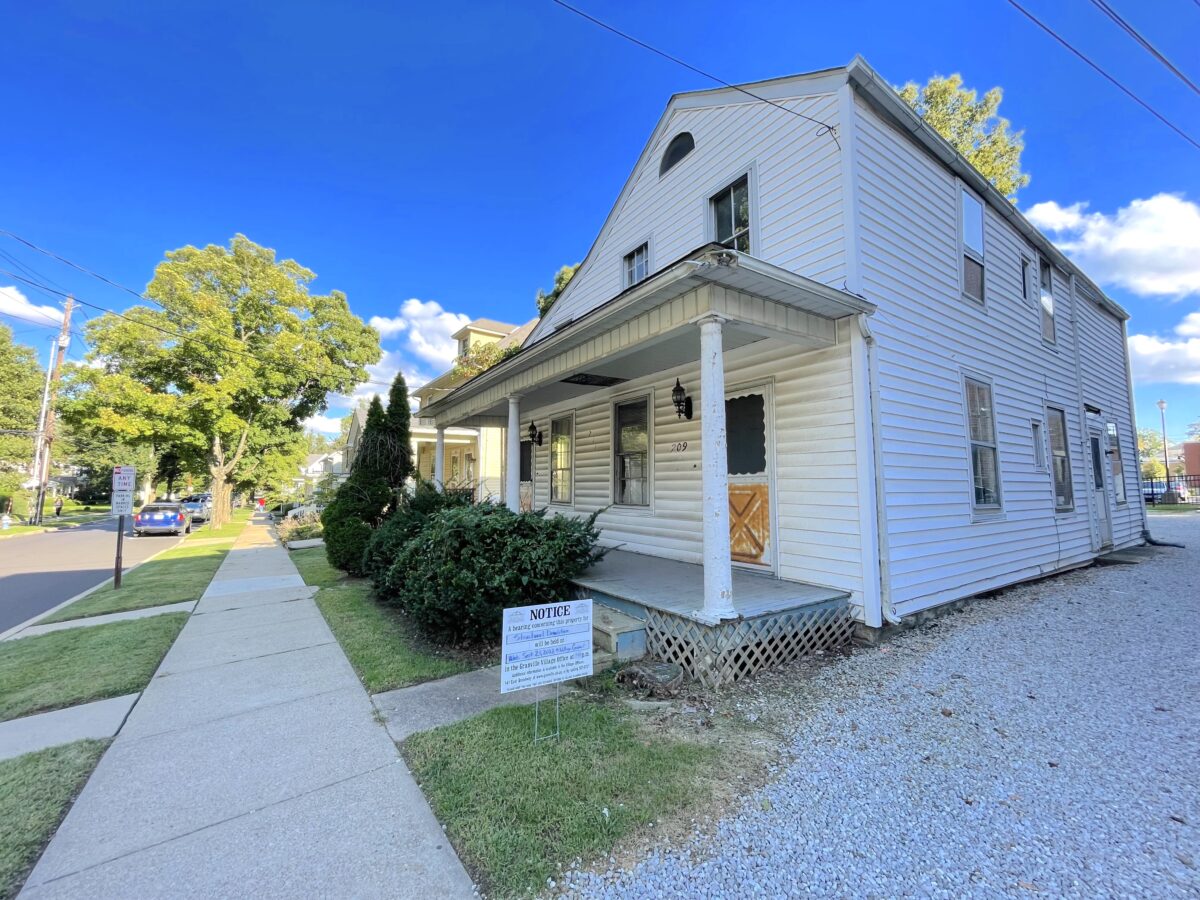First Federal Savings & Loan came a step closer this week to demolishing a Granville house that has been the center of a neighborhood dispute for 20 years.
The Granville Village Council voted Wednesday to give conditional approval for demolition of a house at 209 E. College St. that neighbors had been fighting to retain. For most of those two decades, the late Gloria Hoover led a neighborhood fight against the bank’s desire to turn the house next to hers into a parking lot.
She and many of her neighbors argued that losing the old house would create a gap in the landscape and change the character of their residential neighborhood adjacent to the village’s downtown commercial district.
After Hoover died in February at age 96, First Federal bought her house at 213 E. College, too.
As the Village Planning Commission noted in August in its response to First Federal’s request for permission to demolish 209 E. College, the bank “went as far as purchasing the neighboring property to ensure there would be no owner to complain once the applications were submitted.”

The house at 209 E. College was a single-family home that had been converted into three apartments, which the planning commission report says First Federal kept rented for a time after it bought the place in 2003 for $180,000.
The county now values the property at $238,100 for tax purposes – even in its very poor condition.
Neighbors and the planning commission staff have said for years that the bank was practicing “demolition by neglect” by not maintaining the property, which is just east of Prospect Street, behind the brick building formerly occupied by Three Tigers Brewing Co.
“Staff concludes the applicant allowed the structure to fall into its current state of disrepair,” the planning commission document says. “However, the Village currently has no ordinances relating to demolition by neglect, leaving staff with nothing to enforce.”
The village planning staff described the structure as being “in a state of disrepair that one might refer to as ‘dilapidation.’
“The wooden planks of the front porch appeared rotted, and the porch itself was on a slant. The roof of the porch was missing panels as well. The roof of the house looked to be in poor condition, and the overhang on the back stoop was listing heavily to one side. Gutters along the home had large plants growing from them, indicating a lack of maintenance over a substantial period of time.
“Portions of the siding were missing, and the exposed wood looked rotten and wet. In looking through the windows to the interior, staff noted visible cues that would lead the layperson to believe the structure was unsafe. The doorways were out of plum, and the floors were strongly slanted and uneven.
“As a result, staff concludes this code section to be not only satisfied, but that removal of the structure will positively affect the health, safety, and welfare of the neighboring properties and general community.
Resident Keith Myers, who lives a few doors east on College Street, told the council that the house at 209 E. College never should have been allowed to decay so badly.
“It was clear to us from the beginning that the plan was to let the property deteriorate to the point that it couldn’t be saved,” Myers said, and neighbors have vowed never to let that happen again.
The planning commission staff raised other concerns, which it said “do not necessarily preclude a recommendation of approval (of demolition).
“These concerns are informational only, but should be taken into account by (the) planning commission and village council. Staff is concerned with the removal of potentially affordable housing from the village’s housing stock. This tri-plex has the potential to offer housing to those looking to relocate to Granville, especially young people trying to stay in the community after schooling, or service workers employed in the downtown area.
“That said, the applicant may do with their own property as they see fit. Further, there is no way to know if the property is still salvageable as a habitable dwelling, given its current state. Related to the state of the structure, staff additionally is concerned with the manner in which applicant, and the property, arrived at this point.
“The applicant purchased the property with the sole intention of eventually removing it and constructing a parking lot, even failing to rent the space out for the last several years, despite a tight housing market that would have surely seen it occupied,” the Planning Commission staff wrote.
The planning commission asked the Granville Historical Society to weigh in, and it determined that the house did not have significant historical value.
Myers told the council that the bank’s purchase of Hoover’s house at 213 E. College set off new concerns in the neighborhood, raising fear that the bank would allow a second house to decay by neglect or that the bank would seek to demolish a second house.
“We became alarmed, all of the neighbors, because the bank’s track record of owning property on our street is not great,” he said.
Myers, an urban planner and landscape architect by trade, met with representatives of First Federal to establish conditions for ending the fight against demolition of 209 E. College and securing the future of Hoover’s former home.
They included input on revised drawings for the parking lot First Federal wants to build behind its bank branch at 126 N. Prospect St., and establishing an agreement that the bank would sell Hoover’s home to someone who will maintain it as a single-family residence.
“College Street is a residential street; this stops here,” Myers said to the village council about the demolition of homes on his street. “We will not sit around and let another property follow the age-old demolition-by-neglect story.”
Myers said neighbors would stop protesting the demolition of 209 E. College only on the condition that the bank follows through with the agreement, noting that any deviation would result in community backlash.
John Compton, senior vice president of First Federal, based in Newark, told the council that it would uphold its promises to the neighbors and the village, including the promise to sell Hoover’s former home as a single-family residence.
“We’re going to make it beautiful so that, hopefully, you won’t know there is a parking lot there,” Compton said.
The council’s conditional approval says that First Federal cannot raze the house until the village approves permits for the parking lot, including a decorative brick wall and plantings to screen the parking lot from the street view, ensure that demolition work is consistent with all requirements for the capping of village utility services to the property, and ensure safe removal or capping of other non-village utility services.
To meet those requirements, Compton said that demolition is likely to happen nine months to a year from now.Jack Wolf writes for TheReportingProject.org, the nonprofit news organization of Denison University’s Journalism Program, which is supported in part by the Mellon Foundation.

